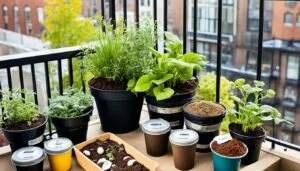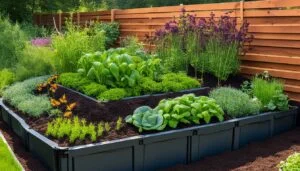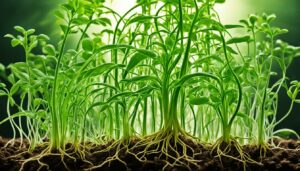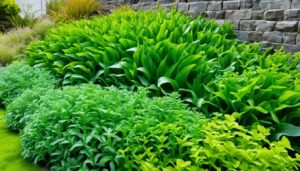Did you know that mycorrhizae, a type of beneficial fungi widely unnoticed in everyday life, form intimate associations with 90% of plant species on earth? This quiet partnership has been a crucial element in the success of the planet’s vegetation. When it comes to mycorrhizae in gardening, these underground allies are just as important, yet often overlooked by home gardeners. In the quest for a greener thumb, incorporating organic gardening with mycorrhizae can revolutionize how we cultivate our favorite plants. These fungi help improve soil health with mycorrhizae and increase mycorrhizae for plant growth, creating a robust, interconnected network beneath our feet.
Gardeners who harness the hidden power of mycorrhizal connections can see significant benefits in their plant’s growth and health. Whether you’re tending to a backyard vegetable patch or in charge of a large-scale ornamental garden, mycorrhizae can mean the difference between a struggling plant and a thriving one.
Key Takeaways
- Understanding the role of mycorrhizae in gardening can lead to vastly improved plant health and yield.
- Beneficial fungi like mycorrhizae play a major role in natural and organic gardening practices.
- Integrating mycorrhizae into gardening is an effective way to promote nutrient and water uptake without synthetic inputs.
- Mycorrhizae improve soil health with mycorrhizae by creating a symbiotic environment that sustains both plants and microbes.
- The use of mycorrhizae contributes to stronger root systems and better overall plant growth.
Unlocking the Power of Mycorrhizae in Gardening
Stepping into the world of gardening with mycorrhizae unlocks a multitude of benefits that are vital for improving soil health and enhancing plant vigor. When considering how to use mycorrhizae, it’s crucial to recognize that these fungi act as a supercharged extension of the plant’s root system. This symbiotic relationship allows for a dramatically increased absorption area for soil nutrients and water—by up to fifty times than that of roots alone.
- Mycorrhizae create an expansive hyphal network that extends well beyond the root zone.
- Nutrient absorption is not only increased but also diversified to include both soluble and insoluble forms.
- A reduction in plant stress and an improvement in plant resilience to conditions such as fluctuating water availability is often observed.
This fascinating adaptation is especially beneficial for house plants; which often face environmental changes and less-than-ideal care conditions. Families like Araceae, Crassulaceae, and Asparagaceae, common in several houseplants, harmonize well with mycorrhizae. This is indicative of the widespread application and mycorrhizae benefits across various forms of indoor and urban gardening.
| Plant Family | Type of Mycorrhizal Relationship | Notable Benefits |
|---|---|---|
| Araceae | Endomycorrhizal | Enhanced phosphorus uptake, drought tolerance |
| Crassulaceae | Endomycorrhizal | Improved nutrient intake, increased resilience |
| Asparagaceae | Endomycorrhizal | Better water absorption, stress adaptation |
The practical application of these remarkable fungi extends far into everyday plant care, from urban homes to extensive gardens. Mycorrhizae facilitate a less demanding care schedule, freeing gardeners from the ties of constant plant monitoring and meticulous water management. The improving soil health with mycorrhizae is not only a step towards greener practices but also an investment in the long-term vitality of plant life in an array of environments.
Enhancing Soil Health with Mycorrhizae and Beneficial Fungi
As our understanding of organic gardening deepens, the importance of creating vibrant soil ecosystems using natural enhancements such as mycorrhizae and beneficial fungi has never been clearer. These dynamic microorganisms play an essential role in forging stronger, more resilient plant life.

Understanding Soil Ecosystems
Mycorrhizae aren’t just beneficial fungi; they’re the cornerstone of soil health in mycorrhizae-enhanced gardening environments. Their microscopic networks are allies to plant roots, extending far beyond the reach a root system could manage alone, thus tapping into untouched reserves of soil nutrients.
A Natural Alternative to Chemical Fertilizers
Organic gardening with mycorrhizae offers a compelling, natural substitute to the chemical fertilizers often laden with potential pollutants. By engaging in a symbiotic exchange with plants, mycorrhizae foster a soil environment rich with essential nutrients, facilitating a healthier, more sustainable form of agriculture.
The Symbiotic Relationship: Nutrients for Sugars
The interdependence between plants and mycorrhizae is simple yet profound: roots provide sugars to the fungi, and in return, the beneficial fungi fetch far-flung soil nutrients. This synergy is pivotal in enhancing soil health with mycorrhizae, ensuring the availability of life-sustaining elements like nitrogen and phosphorous.
Mycorrhizae’s Role in Water and Drought Stress Management
Improving soil health with mycorrhizae also encompasses water retention and drought stress management. The remarkable ability of mycorrhizal networks to hold water improves drought resistance and enables plants to withstand periods of low hydration, evidencing the undeniable mycorrhizae benefits in maintaining ecosystem balance.
Boosting Root Health and Growth
Strong roots equal thriving plants, and mycorrhizae are integral to this equation. By optimizing nutrient and water uptake, mycorrhizae for plant growth don’t simply enhance; they transform gardening into an exercise of nurturing formidable root systems capable of supporting vibrant, flourishing plants.
Adapting to Environmental Stresses and Transplant Shock
The resilience bestowed upon plants by mycorrhizae is essential when faced with environmental stresses or the shock of transplantation. These beneficial fungi equip plants with the tools to quickly adapt and recover, mitigating stress factors and embracing new environments with ease.
Conclusion
As we consider the diverse approaches to enhancing our gardens, it’s clear that the inclusion of mycorrhizae in gardening practices stands as a transformative measure. These remarkable fungi provide an array of benefits that revitalize our plants from the roots up, infusing them with the vigor to absorb nutrients, resist the strain of drought, and flourish amidst environmental challenges. Gardeners who adopt organic gardening with mycorrhizae are not only investing in the health of their plants but are also committing to the larger picture of ecological harmony and soil sustenance.
By integrating mycorrhizae, both seasoned horticulturists and hobbyists can observe a remarkable boost in plant performance. This is manifested in stronger root networks, an augmented capacity for water and nutrient intake, and an overall uplift in plant fortitude and productivity. These enhancements are intrinsic to the practice of organic gardening, reducing dependency on chemical interventions and fostering a more sustainable relationship with our natural environment.
In essence, the collective benefits of mycorrhizae align with the aspirations of anyone looking to nurture their garden with care and respect for nature’s intricate systems. As we continue to uncover the subtleties of soil ecosystems, the role of mycorrhizae stands out as a cornerstone of organic and effective horticulture, guiding us toward a greener future where plants thrive in alliance with these incredible underground partners.








